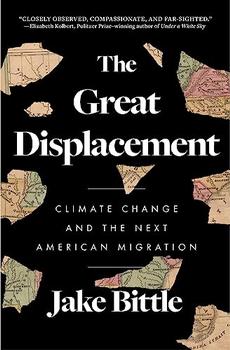Summary | Excerpt | Reviews | Beyond the book | Read-Alikes | Genres & Themes | Author Bio

Rising Seas, Sinking Cities, and the Remaking of the Civilized World
by Jeff GoodellAn eye-opening and essential tour of the vanishing world.
What if Atlantis wasn't a myth, but an early precursor to a new age of great flooding? Across the globe, scientists and civilians alike are noticing rapidly rising sea levels, and higher and higher tides pushing more water directly into the places we live, from our most vibrant, historic cities to our last remaining traditional coastal villages. With each crack in the great ice sheets of the Arctic and Antarctica, and each tick upwards of Earth's thermometer, we are moving closer to the brink of broad disaster.
By century's end, hundreds of millions of people will be retreating from the world's shores as our coasts become inundated and our landscapes transformed. From island nations to the world's major cities, coastal regions will disappear. Engineering projects to hold back the water are bold and may buy some time. Yet despite international efforts and tireless research, there is no permanent solution-no barriers to erect or walls to build-that will protect us in the end from the drowning of the world as we know it.
The Water Will Come is the definitive account of the coming water, why and how this will happen, and what it will all mean. As he travels across twelve countries and reports from the front lines, acclaimed journalist Jeff Goodell employs fact, science, and first-person, on-the-ground journalism to show vivid scenes from what already is becoming a water world.
The Water Will Come is an important book, regardless of where you live. It moves the conversation from a nebulous debate on "climate change" to a concrete set of data points that signal danger in the rising tides. [It] provides historical background on climate change, introduces the work of climatologists, and describes the many costs associated with rising oceans. Goodell writes, "Sea-level rise is one of the central facts of our time, as real as gravity. It will reshape our world in ways most of us can only dimly imagine."..continued
Full Review
 (834 words)
(834 words)
(Reviewed by Chris Fredrick).
In The Water Will Come, journalist Jeff Goodell shares climatology concepts and active research. Here are some notable concepts introduced in the book:

If you liked The Water Will Come, try these:

The Lost Trees of Willow Avenue
by Mike Tidwell
Published 2025
A riveting and elegant story of climate change on one city street, full of surprises and true stories of human struggle and dying local trees – all against the national backdrop of 2023's record heat domes and raging wildfires and, simultaneously, rising hopes for clean energy.

by Jake Bittle
Published 2024
The untold story of climate migration—the personal stories of those experiencing displacement, the portraits of communities being torn apart by disaster, and the implications for all of us as we confront a changing future.